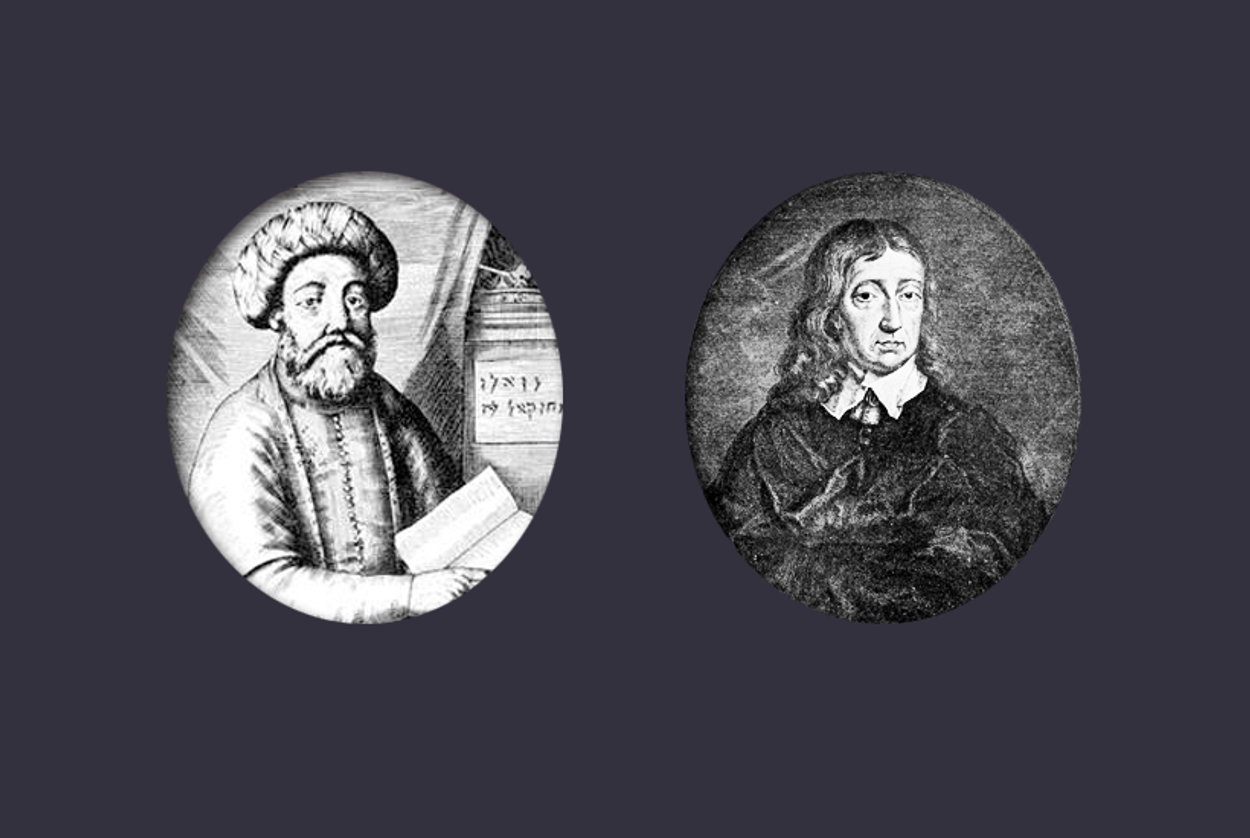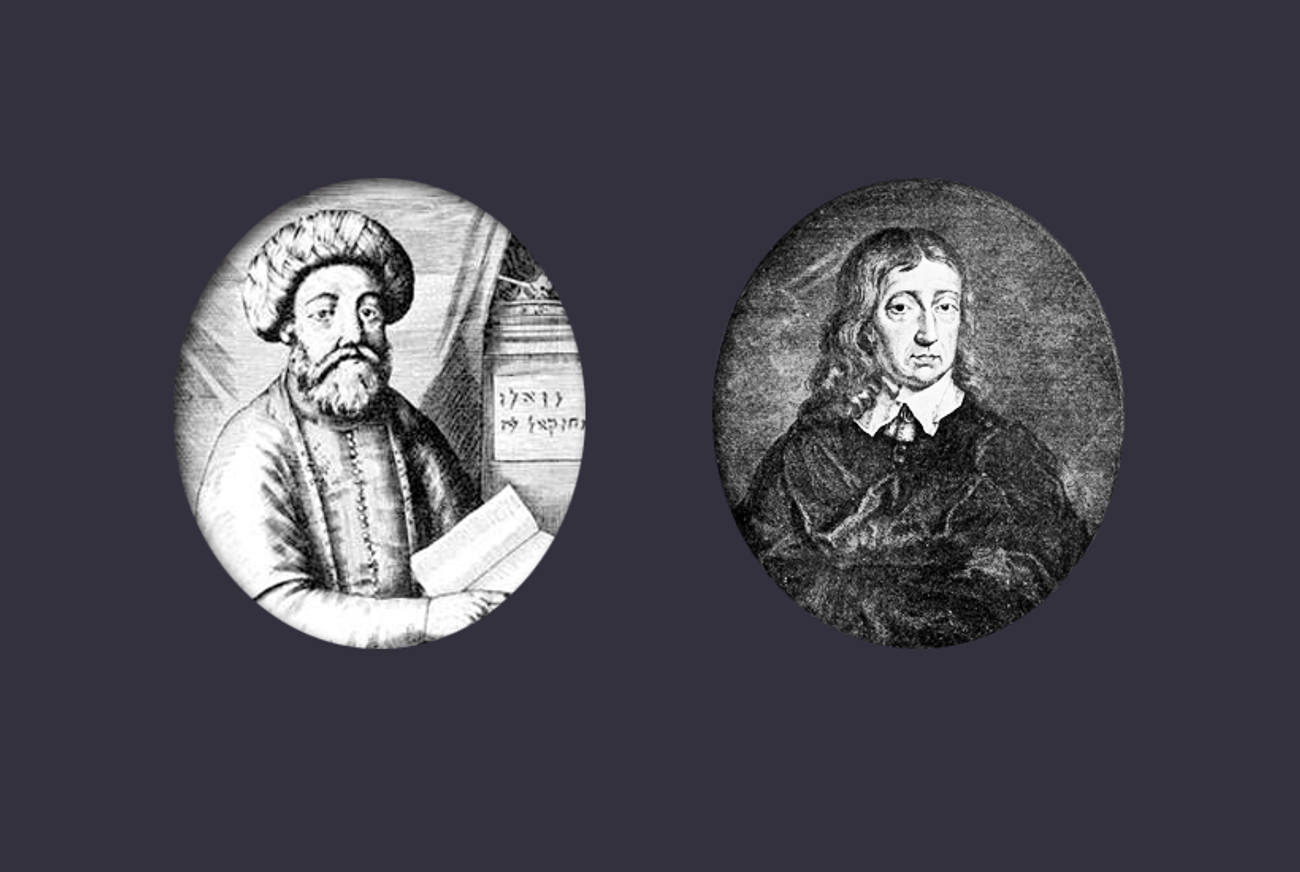Did the False Jewish Messiah Sabbatai Sevi Inspire John Milton’s ‘Paradise Regained’?
The new book ‘Fictions of Conversion’ explores how religious transformation influenced early modern England




The news of a Jewish enthusiast claiming the title of messiah and reports of his massive following throughout Europe, Asia, and North Africa found an avid audience in an England that had been pondering the fate of the Jews in relation to its own status as chosen nation for more than half a century. Reports came in a variety of forms, from letters exchanged between mercantile trading partners to extended narratives such as that of Paul Rycaut, who initially published his account anonymously as part of John Evelyn’s The History of the Three Late Imposters (1669). Rycaut marveled how
Millions of People were possessed, when Sabatai Sevi first appear’d at Smyrna, and published himself to the Jewes for their Messiah, relating the greatness of their approaching Kingdome, the strong hand whereby God was about to deliver them from Bondage, and gather them from all partes of the World.
Michael McKeon has illustrated in the journal of the Association for Jewish Studies how widely the news of the Sabbatian movement circulated in late 1665 and 1666, finding its way into official English newspapers, private correspondences, and popular rumors. 1666 was also the annus mirabilis that witnessed so many apparently apocalyptic events, from the London Fire to the reappearance of the plague to the intensities of the second Anglo-Dutch War. In his poem commemorating this year of wonders, even the writer most directly associated with Restoration poetics, John Dryden, could not help making mention of the Jewish enthusiast: “The wily Dutch, who, like fallen angels, feared/ This new Messiah’s coming, there did wait,/ And round the verge their braving vessels steered,/ To tempt his courage with so fair a bait.”
While there is no explicit evidence of John Milton having heard of the Sabbatian movement, it is difficult to imagine that he would not have encountered news about these extraordinary events that so fascinated his countrymen. We may even speculate about two specific connections. First, Milton’s longtime friend and correspondent Henry Oldenberg, who had by this time become the secretary to the Royal Society, was so intrigued by the news of Sabbatai Sevi that he wrote several letters to Baruch Spinoza inquiring about the meaning of these events. Second, Edward Phillips, Milton’s nephew, pupil, and biographer, became John Evelyn’s son’s tutor some time after October 1663 and remained in that position until February 1665. Milton is also believed to have had his own direct contacts with Evelyn. Whether these contacts were before or after Evelyn’s publication of his account of Sabbatai Sevi, or before or after Milton began the planning and composition of his late poem Paradise Regained is a matter of speculation. It remains a tantalizing possibility, however, that the two spoke in some detail about this contemporary instance of a failed Jewish messianism.
I have argued elsewhere that Milton’s writings should be viewed in the context of his perception of himself and of his fellow countrymen as occupying historical and religious positions parallel to those of the Jews in the wake of the destruction of the Temple, as rabbinic Judaism began to emerge. The extremes of Jewish and English messianism become identified with one another around the time that Milton is planning and composing Paradise Regained. The Sabbatian movement thus became a cipher for different tensions characteristic of the Christian discourses of enthusiasm, messianism, and conversion. On the one hand, we find ongoing and explicit analogies between Sabbatai Sevi and the Quakers, not only in England but throughout Europe. The criticism of the Quakers implied by such a comparison is unmistakable. On the other hand, there are reports that stress the political and militaristic aspects of Sabbatai’s followers, reports that strongly resonate with the memory of Thomas Venner’s abortive Fifth Monarchy uprising only five years earlier. One letter describes how the Turkish Bashaw
resolved to march on with his Forces [against the Israelites], and coming within sight of the City, discovered an Innumerable multitude of people getting out of their Tent, whereupon the Turks gave Fire and shot against them, but after a little fighting, a pannick fear took them, and terror seized on them and made them cry out, Who can fight these people, seeing our Arrows return back upon our selves!!
As seemingly incompatible as these two views are—the Sabbatians as Quakers and the Sabbatians as advocates of military action like Venner’s Fifth Monarchists—they both reflect the anxieties felt by entrenched, normative Christianity in the face of various enthusiastic movements agitating for dramatic change, individually and collectively. These were movements of rapid, often violent, transformation over which they had little control. Evelyn draws the connection quite explicitly in his address to his reader, where he wishes that “our modern Enthusiasts, and other prodigious Sects amongst us, who Dreame of the like Carnal Expectations, and a Temporal Monarchy, might seriously weigh how nearly their Characters approach the Style and Design of these Deluded Wretches, least they fall into the same Condemnation, and the Snare of the Devil.”
Christian reactions to Sabbatai Sevi were part of a debate that was conducted between established intellectuals and clergymen, on the one hand, and those who challenged their status on the other. Since many of the enthusiasts of the time, including Sabbatai Sevi, also challenged secular authorities, this was a confrontation with obvious political, as well as purely religious, implications. The Jewish Messiah from Smyrna thereby played a role in both the religious and political discourse in Europe of that period, offering a discursive site in which the fraught relationship between historical reality and religious authenticity could be interrogated. Rycaut positions himself in sympathy with the Jewish intelligentsia, the rabbis and elders in the community, who understand the extent of the threat the Sabbatians pose to the survival of the Jewish community. Alongside the critique of popular beliefs among both Christians and Jews, there runs throughout Rycaut’s text a sense of solidarity between the Christian elite (political, religious, and intellectual) and that part of the Jewish elite that opposed Sabbatai Sevi. The parallels between the Christian and Jewish enthusiastic movements were believed to be so strong that Rycaut even suggests that the Sabbatian movement was itself produced by Christian millenarian, proselytizing fervor. (Gershom Scholem’s magisterial 1973 account of the Sabbatian movement, Sabbatai Sevi: The Mystical Messiah, takes strong issue with this claim.)
According to the Predictions of several Christian Writers, especially of such who Comment on the Apocalyps, or Revelations, this Year of 1666 was to prove a Year of Wonders, of strange Revolutions in the World, and particularly of Blessing to the Jewes, either in respect of their Conversion to the Christian Faith, or of their Restoration to their Temporal Kingdome: This Opinion was so dilated, and fixt in the Countreys of the Reformed Religion, and in the Heads of Phanatical Enthusiasts, who Dreamed of a Fift Monarchy, the downfall of the Pope, and Antichrist, and the Greatness of the Jewes: In so much, that this subtile People judged this Year the time to stir, and to fit their Motion according to the season of the Modern Prophesies; whereupon strange Reports flew from place to place …
Rycaut’s targets, though unnamed here, are clear; they include the likes of Serrarius, John Dury, Jan Comenius, and other radical millenarians, as well as sectarians like the Quakers. The Sabbatian movement inevitably became enfolded within these extensive English discussions of Jewish restoration and conversion that were such defining elements of the discourse of Jews and Judaism in the 17th century.
We may also observe how Rycaut’s account anticipates Satan’s temptation of the Son in Milton’s Paradise Regained to “fit [his] Motion according to the season of the Modern Prophesies,” or, as the Tempter puts it, “thy Kingdom, though foretold/ By Prophet or by Angel, unless thou/ Endeavor, as thy Father David did,/ Thou never shalt obtain” (3. 351-54). Satan speaks in the language of English millenary urgency and expectation.
Milton’s project in his brief epic, published in 1671, five short years after Sabbetai Sevi’s conversion to Islam, was to distinguish the true form of Christian messianic redemption from the false—and specifically Judaic—conception of the messiah that Jesus would have encountered among his contemporaries and that had so recently been revived both within the Jewish community (the Sabbatian movement) and in Christian Europe (the Fifth Monarchists and other politically motivated enthusiastic movements). I think it is possible to read Paradise Regained as Milton’s ambivalent response to the expectations of many of his contemporaries, whether they were advocates of a politicized messianism or promoters of an inner salvation that implied a retreat from material history and all its attendant struggles. In the brief epic Satan urges Jesus to acquire wealth in preparation for what he construes as the Son’s necessarily worldly mission of salvation.
Great acts require great means of enterprise;
Thou art unknown, unfriended, low of birth,
A Carpenter thy Father known, thyself
Bred up in poverty and straits at home;
Lost in a Desert here and hunger-bit:
Which way, or from what hope, dost thou aspire
To greatness? whence Authority deriv’st?
What Followers, what Retinue canst thou gain,
Or at thy heels the dizzy Multitude,
Longer than thou canst feed them on thy cost?
Money brings Honor, Friends, Conquest, and Realms;
What rais’d Antipater the Edomite,
And his Son Herod placed on Judah’s throne,
(Thy throne) but gold, that got him puissant friends?
Therefore, if at great things thou wouldst arrive,
Get Riches first, get Wealth, and Treasure heap,
Not difficult, if thou hearken to me,
Riches are mine, Fortune is in my hand;
They whom I favour thrive in wealth amain,
While Virtue, Valor, Wisdom, sit in want.
(2. 412-431)
Modern editions of the poem have noted the irony built into this reference to the family of Antipater who, as the Son must know, had sought to kill him as part of the massive slaughter of the innocents. Yet the reference to Herod is far more knowing and ironic even than these annotations suggest, since Herod was considered by Jews to be the preeminent example of a false messiah, having laid claim to a specious lineage in order to become anointed in David’s throne.
This passage is excerpted from Fictions of Conversion: Jews, Christians, and Cultures of Change in Early Modern English, reprinted with the permission of the University of Pennsylvania Press, and may not be reused or redistributed without its written permission.
Jeffrey Shoulson is Konover Chair of Judaic Studies and Professor of Literatures, Cultures, and Languages at the University of Connecticut, where he also serves as director of the Center for Judaic Studies.